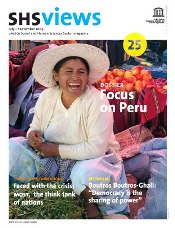| |
 |
 |
|
 |
 |
| SHSviews 25 |
| |
| UNESCO Social and Human Sciences Sector Magazine |
 |
| Interview with Boutros Boutros-Ghali, Vice-President of the Permanent Forum of Arab-African Dialogue / Faced with the crisis: MOST, the think tank of nations / Dossier – Focus on Peru – July-September 2009 (English | Français | Русский) |
 |
 2009, a Key Date for the MOST Programme 2009, a Key Date for the MOST Programme
A few years are always needed to assess the effectiveness of a strategy. This stage can be done neither too early, nor too late. Two years, five years, ten years… the key moment depends on the scale of the project. Needless to say the scale of the UNESCO Management of Social Transformations (MOST) Programme is particularly significant.
Unique within the United Nations system, the programme attempts to contribute to the development of appropriate public policies, through dialogue between social science research and decision-makers, which better respond to changes in our societies.
In a period of crisis, where populations have never been more interconnected and when faced with social emergencies, public intervention has never been more legitimate, 2009 is in many ways a pivotal year for the programme that entered a new phase just 5 years ago.
As expressed in this issue, the 9th Session of the MOST Intergovernmental Council (IGC) to be held in late September at UNESCO headquarters should enable it to steer a new course. This meeting will not only provide an opportunity to measure the success of the progress achieved since 2004 but also, to increase its impact particularly through the adoption of guidelines that support the development of most National Liaison Committees in each country in which it operates.
At the heart of its work, a true “Interregional Forum for Social Development” will allow policymakers, social scientist researchers and stakeholders in civil society and the private sector to gather around the same table to discuss social responses made to the international economic crisis.
At a time when we have crossed the symbolic level of over one billion people suffering from hunger in the world, these discussions will undoubtedly remind us how this crisis has served as a “telling indicator of the choices of our society”. Furthermore, how important it is to use reliable data to inform these choices, which enable us to better anticipate the changes taking place at a steady pace around the world.
This is, in other words, what we have written and what is echoed by the former Secretary-General of the United Nations, Mr. Boutros Boutros-Ghali, His Serene Highness Prince Albert II of Monaco and the Argentinean political scientist Atilo Borón, laureate of the José Martí Prize of 2009, each of whom advocate for better informed and more collective action.
Since this demand is the primary ‘raison d’être’ of MOST, we hope that this new stage, to be implemented in September will allow it to contribute, further still, to responding to a need that the global crisis only exacerbates: that of the need for a genuine Think Tank of Nations.
Pierre Sané
Assistant Director-General of UNESCO
for Social and Human Sciences
This issue of SHSviews covers topical issues from July to September 2009:
An interview with… Boutros Boutros-Ghali: “Democracy is the sharing of power”.
Vice-President of the Permanent Forum of Arab-African Dialogue, created with the support of UNESCO, the former UN Secretary-General was in Paris during the month of March 2009 to participate in the first meeting of the Forum’s Committee. On this occasion, Boutros Boutros-Ghali, responding to questions from SHSviews, stressed “the importance of democratizing globalization” and strengthening “South-South solidarity”. More...
Faced with the crisis: MOST, the think tank of nations
Representatives of 35 member countries of the Intergovernmental Council (IGC) of the UNESCO Management of Social Transformations (MOST) Programme will meet in Paris at the end of September 2009 to decide on the future direction this “think tank” of nations will take. More...Dossier: Focus on Peru
After the Philippines, Canada, Malawi, Cuba, Lebanon and the Netherlands, SHSviews continues to explore the ways in which UNESCO National Commissions address the social and human sciences. Travelling now to Peru, SHSviews has discovered a Commission that has contributed to the implementation of UNESCO programmes for more than 62 years.Also in SHSviews n°25:
|
 |
 |
 Email this page Email this page  Printable version Printable version
|
 |
|
|


